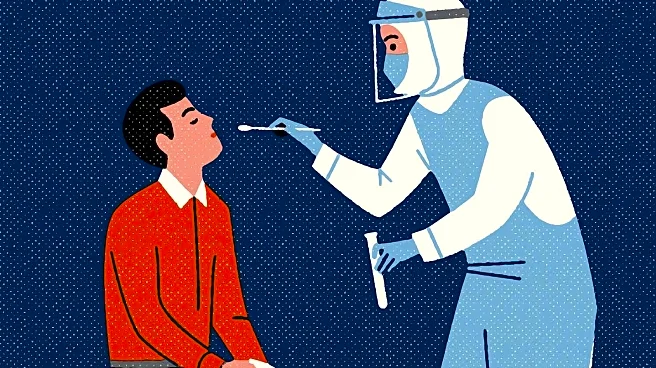What is the story about?
What's Happening?
A study conducted by the Florey Institute of Neuroscience and Mental Health has revealed that COVID-19 infection can lead to changes in sperm, potentially impacting the behavior of offspring. Using a mouse model, researchers discovered that male mice infected with SARS-CoV-2 before mating produced offspring exhibiting higher levels of anxiety-like behaviors. These changes were attributed to alterations in non-coding RNA in sperm, which are crucial for regulating gene expression. The study, published in Nature Communications, highlights significant changes in gene activity in the hippocampus of female offspring, a brain region essential for mood and anxiety regulation. The findings suggest that the pandemic could have enduring effects on future generations, although further studies in humans are necessary.
Why It's Important?
The implications of this study are significant, as they suggest that COVID-19 may have long-term effects beyond immediate health concerns, potentially influencing mental health and development in future generations. If similar effects are observed in humans, millions of children worldwide could be affected, raising concerns about mental health and developmental challenges. This research underscores the importance of considering COVID-19 not only as an acute illness but also as a factor that may impact reproductive health and the well-being of future generations. The study contributes to the understanding of epigenetic inheritance, where environmental factors like viral infections can alter molecular information in sperm, influencing the next generation without changing the DNA sequence.
What's Next?
Further research is needed to determine if the mechanisms observed in mice occur in humans. Researchers plan to examine sperm from men who have recovered from COVID-19 to study potential behavioral or neurological impacts on their children. Understanding these effects could inform public health guidelines, reproductive advice, and early interventions to mitigate long-term consequences. The study opens new avenues for exploring how viral infections can indirectly shape brain development and behavior in offspring, emphasizing the need for comprehensive research in this area.
Beyond the Headlines
The study highlights the concept of epigenetic inheritance, where environmental factors, including viral infections, can alter molecular information in sperm. Such changes can influence the next generation without altering the DNA sequence itself. This finding builds on previous knowledge that factors like diet and stress can have similar transgenerational effects, showing that COVID-19 may add another layer of influence. The research emphasizes the importance of understanding the broader impacts of COVID-19, potentially leading to new insights into reproductive health and the transmission of behavioral traits across generations.















